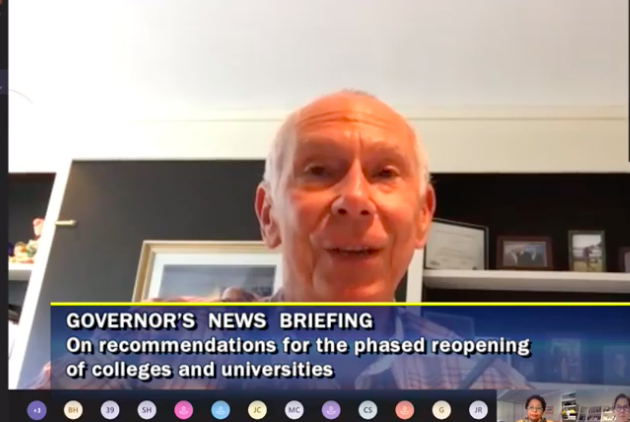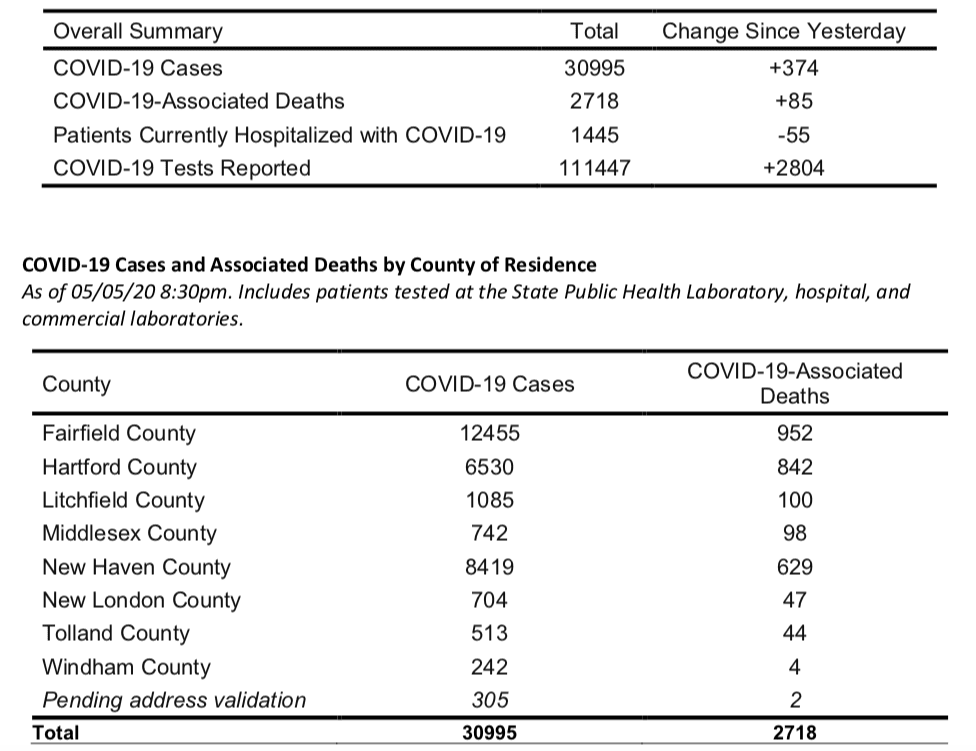Connecticut Cautiously Plans to Bring College Students Back in Phases

Audio By Carbonatix

Mark Ojakian, president of state colleges and universities, speaks about the reopening of higher education institutions Wednesday.
Research programs could resume as early as May 20, but it’s unclear if campuses will reopen fully this fall.
By Patrick Skahill, Connecticut Public Radio for CTMirror.org
West Hartford specific information provided by Ronni Newton, We-Ha.com
Connecticut will adopt a phased-in approach to reopening state colleges and universities, officials said Wednesday. The plan could mean research programs resume as early as May 20, but it remains unclear if campuses will reopen fully to students this fall.
“The plan is to move forward and try to conduct as much instruction in person as possible,” said Mark Ojakian, president of the state colleges and universities.
But Ojakian said officials are looking at a variety of contingency plans, including online learning programs for faculty and students who may not be able to return to campus due to a second wave of COVID-19 cases, travel restrictions or pre-existing health issues.
“We’re looking at all the options to make it as easy for students as possible,” Ojakian said.
UConn President Thomas Katsouleas said that, as the school plans for a widespread return to in-person learning in September, he still anticipates a “mix of in person and online options,” especially for international students.
“That will accomodate the health concerns for the faculty as well,” Katsouleas said.
Over the coming months, state officials said they envision rolling out a tiered plan for state colleges and universities.
The first stage of reopenings would coincide with Gov. Ned Lamont’s reopening date for some businesses: on May 20, administrative functions and research programs could begin to resume.
From there, officials said, non-residential workforce and degree completion programs would start back up in early summer, with an emphasis on fulfilling lab, studio, clinical, or shop requirements for community college students getting degrees this spring.
In mid-July, some schools could resume graduate programs, if they choose, officials said.
State officials are targeting Sept. 1 as the date when undergraduate residential programs and boarding schools could resume, but cautioned all the reopening targets assume an improvement in public health conditions and a ramp up in COVID-19 testing.
Rick Levin, a co-chair on the education committee of Lamont’s “Reopen Connecticut Advisory Group,” said a lot depends on prevailing health conditions in the fall.
He said a rise in hospitalizations or any second wave of COVID-19, could quickly scuttle plans for any widespread reopening of campuses.
“Schools need to be flexible. They need to be ready to open, but they also need to be ready to move online if absolutely necessary,” Levin said.
Meanwhile, statewide hospitalization numbers trended back down Wednesday, dropping by 55 people. The total number of COVID-19 hospitalizations is now 1,445 and 2,718 people have died due to complications from the virus.
Statewide there were 374 positive cases reported Wednesday, out of 2,804 tests. Lamont called the smaller percentage “a good sign of what’s going on.”
West Hartford now has 352 confirmed positive cases of COVID-19. There was one more fatality reported Wednesday in West Hartford, bringing the total to 66, according to data reported by the state.

Lamont started his day at Hartford Hospital, where he spoke to a crowd of 575 health care workers who attended a National Nurses Week celebration to recognize the work nurses do, particularly during the COVID-19 pandemic.

Gov. Ned Lamont leans over to speak to a health care worker at a National Nurses Week celebration at Hartford Hospital while keeping social distance. Lamont spoke to the crowd of 575 Hartford Hospital workers who attended the mid-day event to recognize the work nurses do, particularly during the COVID-19 pandemic. Courtesy of Connecticut Public Radio/CTMirror.org
Secretary Of State guidance on absentee ballot voting casts wide net
As federal and state officials urge residents to stay home in an effort to slow the spread of coronavirus, the question of who can legally cast an absentee ballot in the state’s upcoming elections has sent voting officials combing through state statutes.
On Wednesday, the state’s chief election officer issued her interpretation of one law that allows people with certain illnesses to vote absentee. She said she believes there is some flexibility in its language, but that the legislature could “fix this permanently” when it comes into session this summer.
Currently, Connecticut has strict requirements about who is legally allowed to cast an absentee ballot. State law allows absentee voting for active members of the military, people who will be out of town or can’t vote on election day because of religious reasons, certain members of the disabled community, and for some people who are ill.
Earlier this week, Secretary of the State Denise Merrill said her office would be mailing absentee ballot applications to every voter in the state. And today, she issued an opinion to local election officials, which said the current public health and civil preparedness emergencies carve out some leeway under that final absentee ballot qualifier: people who are ill.
“It is clear that this … statutory section … does not limit the term illness to an individual who has limited mobile function or is hospitalized or confined to a bed,” Merrill wrote. “In fact, the Centers for Disease Control have identified numerous pre-existing illnesses that put certain individuals at increased risk when exposed to the COVID-19 virus.”
Merrill said those illnesses include people of all ages with underlying medical conditions, those with chronic lung disease or moderate to severe asthma, heart conditions, people who are immunocompromised through a variety of factors including everything from cancer treatment to smoking, and people with “severe obesity.”
Merrill said the CDC at-risk guidance also extends to include people with diabetes, those with chronic kidney disease undergoing dialysis, liver disease, and pregnant women.
Based on that CDC guidance, Merrill said, “any registered voter who has a pre-existing illness can vote by absentee ballot because that voter’s illness would prevent them from appearing at their designed polling place safely.”
People in contact with someone infected with COVID-19 would also qualify to vote via absentee ballot, Merril said, “such as healthcare workers, first responders, individuals who are caring for someone at increased risk, as well as those that feel ill or think they are ill because of the possibility of contact with the COVID-19 virus.”
“Connecticut has the most restrictive absentee ballot laws in the country, and the coronavirus has exposed how that restrictiveness can threaten our democracy,” Merrill said in a statement. “The legislature can and should fix this permanently when they come into session in the summer by removing the most restrictive language from the statute.”
During his afternoon briefing, Lamont said he anticipates issuing an “executive order that makes it easier to vote for the primary in August.”
“We are going to have the legislature come back into session, probably in June,” Lamont said. “I’ll put front and center that we’re going to have to solve the opportunity for people to vote remotely in November, as well – at least those folks of a certain age, that should not be going out to the voting booth.”
Connecticut’s primary is scheduled for Tuesday, Aug. 11.
Expect “red button” on state unemployment website soon, state says
Self-employed individuals in Connecticut have been wondering this week why it’s taking so long for a red button to pop up on the state’s department of labor website.
Clicking that red button is one step in a convoluted federally-mandated process self-employed workers need to follow if they want to receive Pandemic Unemployment Assistance (PUA) under the federal CARES Act.
The only problem is the button still isn’t up yet.
Lamont’s chief operating officer Josh Geballe said Wednesday the state was tasked with building this system from scratch and that kinks in the new system hadn’t been worked out yet.
“It has to be tested before it’s deployed and in the final testing, there was a bug that was encountered, so they were fixing that,” Geballe said. “We hope to have that fixed and ready to be launched very, very soon.”
Some 38,000 self-employed citizens have already executed a first critical step – applying to the state’s filing system, according to the state Department of Labor.
The federal government requires people to apply for, and be denied, state benefits before they can access PUA assistance.
PUA can offer up to 39 weeks of unemployment benefits to independent contractors and gig workers who weren’t eligible for traditional state assistance. The amount of benefits paid out will vary by state.
The state says over 477,000 unemployment applications have been filed since March 13 – a number the labor department said represents more than what they’d typically get in a three-year period.
Federal DOJ joins fight against COVID-19 scammers
Federal authorities said they are instituting a dedicated COVID-19 fraud coordinator, who will work with state officials to investigate and prosecute a growing panoply of COVID-19 scams, including charity and cyber fraud.
Connecticut U.S. Attorney John Durham announced the joint federal-state task force Wednesday.
“The Justice Department is prioritizing the investigation and prosecution of COVID-19 fraud schemes and individuals who are exploiting this public health crisis for personal gain,” Durham said in a statement. “Working together, we will disrupt these schemes and are prepared to prosecute those who seek to prey upon people’s fears or sympathy and illegally profit from this pandemic.”
The DOJ said those schemes include: price gouging, healthcare and government program fraud, consumer and small business scams, lending scams, charities fraud, and cyber fraud.
Violators may be subject to civil fines and penalties and/or state or federal criminal prosecution, the office said.
Some of those most common scams so far involve federal COVID-19 stimulus checks. The DOJ said the federal government will “never charge fees or ask you to pay money to receive your check. The federal government will never call to ask for your Social Security number, bank account, or credit card number.”
It also warned residents to check that the charities they are donating to are legitimate, and it urged small business owners to be wary of scammers offering dubious loans.
Federal officials said Connecticut residents may report COVID-19 related fraud by contacting the Office of the Attorney General via email at [email protected] or by calling 860-808-5318.
Bottle redemption set to come back at supermarkets across state
Since March 17, retailers across Connecticut have been allowed to suspend bottle collections at their stores over concerns about the spread of the novel coronavirus.
On Wednesday, state environmental officials announced that the ban will be lifted on a limited basis beginning May 20, with a full resumption of bottle redemption operations by June 3.
Details will be posted at individual retailers, but the Department of Energy and Environmental Protection said in a statement that customers should expect “a daily limit on the number of containers, limited hours to facilitate cleaning, and appropriate social distancing requirements and the wearing of masks.”
“Beginning May 20, Connecticut retailers that fail to accept empty beverage containers for redemption under the law known as the ‘bottle bill’ will once again be subject to enforcement actions by DEEP,” the agency said.
Connecticut Public Radio’s Frankie Graziano and Jeff Cohen contributed to this story.
Reprinted with permission of The Connecticut Mirror.
Like what you see here? Click here to subscribe to We-Ha’s newsletter so you’ll always be in the know about what’s happening in West Hartford! Click the blue button below to become a supporter of We-Ha.com and our efforts to continue producing quality journalism.



